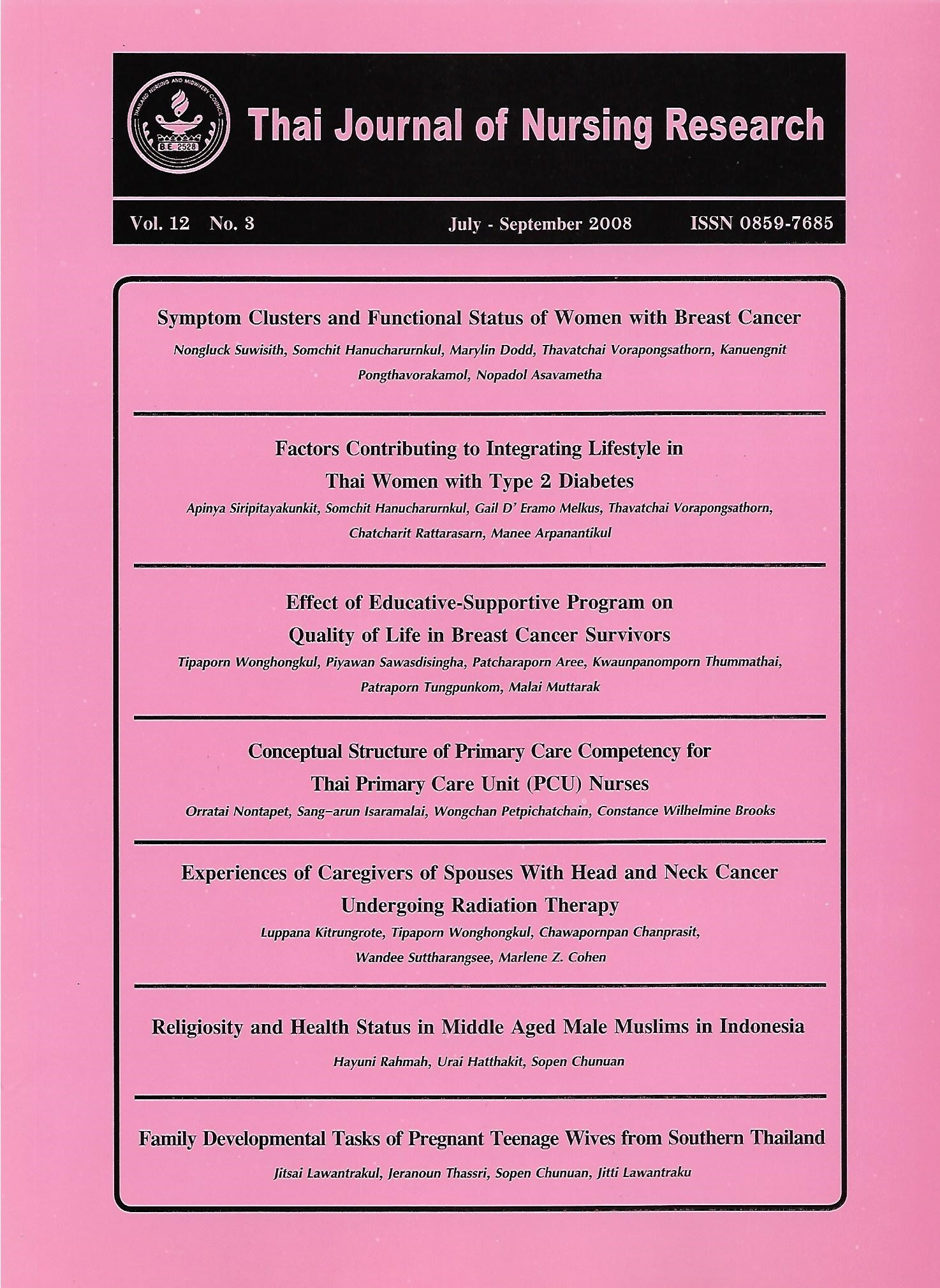Conceptual Structure of Primary Care Competency for Thai Primary Care Unit (PCU) Nurses
Keywords:
การบริการปฐมภูมิ, พยาบาลหน่วยปฐมภูมิAbstract
บทคัดย่อ
ตั้งแต่มีการนำระบบการประกันบริการสุขภาพถ้วนหน้ามาใช้ในปี พ.ศ. 2544 หน่วยบริการ ปฐมภูมิทั่วประเทศไทยมีพยาบาลวิชาชีพปฏิบัติงาน แม้ว่าระยะเริ่มแรกพยาบาลเหล่านี้จะขาดประสบการณ์ ในการบริการปฐมภูมิ ซึ่งถูกคาดหวังว่าจะให้บริการได้เหมือนการให้บริการพยาบาลในโรงพยาบาล จากความคาดหวังดังกล่าวทำให้พยาบาลหน่วยปฐมภูมิต้องเพิ่มสมรรถนะการบริการปฐมภูมิ โดยการฝึกอบรมเพื่อให้มีสมรรถนะการบริการปฐมภูมิเพิ่มขึ้น ทั้งที่ กรอบแนวคิดโครงสร้างสมรรถนะการบริการ ปฐมภูมิของพยาบาลหน่วยปฐมภูมิไทยยังไม่ได้กำหนดชัดเจน ดังนั้น การศึกษาครั้งนี้เพื่อศึกษากรอบแนวคิด โครงสร้างสมรรถนะการบริการปฐมภูมิของพยาบาลหน่วยปฐมภูมิไทย
การศึกษาประกอบด้วย 2 ขั้นตอน คือ 1) การทบทวนวรรณกรรม ที่ตีพิมพ์ทั้งในประเทศ และต่างประเทศ 2) การสัมภาษณ์ ผู้เชี่ยวชาญด้านการพยาบาล ผู้บริหารหน่วยปฐมภูมิ พยาบาลหน่วยปฐมภูมิ และเจ้าพนักงานสาธารณสุขชุมชนหรือนักวิชาการสาธารณสุขที่ปฏิบัติงานที่เดียวกัน ผลการศึกษาพบว่า กรอบแนวคิดโครงสร้างสมรรถนะการบริการปฐมภูมิของพยาบาลหน่วยปฐมภูมิไทยประกอบด้วย 4 องค์ประกอบหลัก คือ การสร้างสัมพันธภาพระหว่างบุคคล การจัดการดูแล การให้บริการแบบผสมผสาน และความรับผิดชอบในวิชาชีพ การสร้างสัมพันธภาพระหว่างบุคคลประกอบด้วย การติดต่อสื่อสาร การประสานงาน การทำงานเป็นทีม การมีส่วนร่วมในสังคม การให้ความร่วมมือและการสนับสนุน การจัดการดูแลประกอบด้วย การจัดการระบบบริการ การบริหารทรัพยากร การจัดการสิ่งแวดล้อมทางด้านสุขภาพ การจัดการด้านคุณภาพและการจัดการด้านข้อมูล การให้บริการแบบผสมผสาน ประกอบด้วย การส่งเสริมสุขภาพ การป้องกันโรค การรักษาพยาบาล การฟื้นฟูสมรรถภาพ การดูแลอย่างต่อเนื่องและการดูแลแบบองค์รวม ความรับผิดชอบในวิชาชีพ ประกอบด้วย ความรู้สึกไวต่อคุณธรรมจริยธรรม การเคารพในสิทธิผู้ป่วย ความรับผิดชอบต่อจรรยาบรรณวิชาชีพ การพิทักษ์สิทธิผู้ป่วย การพัฒนาวิชาชีพและการพัฒนาตนเอง กรอบแนวคิดที่ได้จากผล การวิจัยครั้งนี้สามารถเป็นแนวทางในการทำวิจัย ใช้เป็นประโยชน์ในการกำหนดแบบพรรณนาลักษณะงาน และการพัฒนาเครื่องมือประเมินสมรรถนะต่อไป
คำสำคัญ : การบริการปฐมภูมิ พยาบาลหน่วยปฐมภูมิ
Abstract
Since the introduction of universal healthcare coverage in 2001, professional nurses have worked in primary care units throughout Thailand. Although they did not have practical primary care experience, Thai nurses, initially were expected to delivery primary care services like in hospitals where they worked. In order to meet the increased need for primary care competency, many of the nurses received additional training as nurse practitioners. However, the concept and framework for primary care competency, for Thai primary care unit (PCU) nurses, has not been clearly defined. Therefore, the purpose of this investigation was to explore the concept and structure of primary care competency for Thai PCU nurses.
The investigation was carried out using a two-step approach, which consisted of: a) an integrated systematic review of national and international publications and b) interviews of nursing experts, primary care authorities, primary care nurses and public health staff. From the data, the concept of primary care competency was placed into four domains. The first, interpersonal relationship consisted of communication, coordination, team work, social involvement, collaboration, and facilitation. The second, care management included service system management, resource management, quality management, information management, and environmental health management. The third, integrated healthcare service consisted of health promotion, disease prevention, treatment/prescription, rehabilitation, continuous care, and holistic care. The last, professional accountability consisted of moral sensitivity, patient rights respectability, code of ethics, patient advocacy, professional development, and self-development. The conceptual structure created, as result of this research, can serve as a framework for guiding future research, facilitating the creation of specific and detailed job descriptions, and developing a competency assessment instrument.
Keywords: Primary care competency, Primary care unit nurses
Downloads
How to Cite
Issue
Section
License
Copyright: The Pacific Rim International Journal of Nursing Research, Thailand Nursing & Midwifery Council has exclusive rights to publish, reproduce and distribute the manuscript and all contents therein.








.png)



